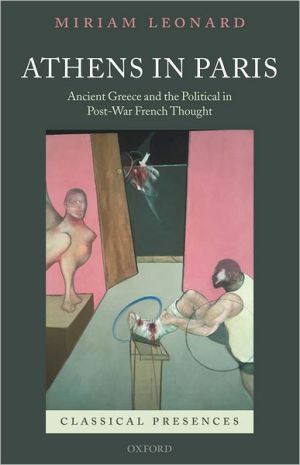

 |

|

The average rating for Athens in Paris: Ancient Greece and the Political in Post-War French Thought based on 2 reviews is 4 stars.
Review # 1 was written on 2020-07-24 00:00:00 James Hart James HartSome people pride themselves on finding fart jokes and cock jokes unfunny. "It's the lowest form of humor!" they scoff, then try to direct you to something more sophisticated and mature. Well, it is refreshing to learn that fart jokes and cock jokes are precisely where Western humor began, and were good enough, indeed the specialty of, one of the greatest comic playwrights who ever lived. If elevated wit mixed with incisive social criticism are what you want, go read Bernard Shaw. If you want complex exploration of human motivation and vice, read Shakespeare. If you want extremely broad and larger-than-life characters engaging in utterly insane plots while throwing cock and vagina and tit and ass and fart jokes and insults back and forth faster than you can keep track, than Aristophanes is the man for you. You'll also get more than your share of female-bashing, old person-bashing, government official-bashing, celebrity-bashing, and every other kind of bashing you can imagine. This is comedy of the throw-everything-at-the-wall-and-see-what-sticks variety, and if you can get into that over-the-top mindset, you'll have a great time with this. The Birds is a genuine fantasy, something I was surprised to see (I had thought that all supernatural elements in Ancient Greek literature came from myth). It's about a disgruntled Athenian who convinces a bunch of birds to build a magic city in the sky (called Cloudcuckooland) in order to separate the humans from the gods and help the birds regain their supposedly natural bird-ascendency over the universe. The birds fall for it, choosing the disgruntled Athenian as their leader, and the protagonist's rise to power over the world of birds, humans, and eventually gods is portrayed with flair and comic intensity. The play is almost epic in its ludicrousness. Lysistrata is the famous play where the women take over the city and refuse to offer sex to the men unless they promise to end the war on Sparta. Don't kid yourself - this is not necessarily a feminist play, at least not by modern standards, but it is a very funny one, and a very good one. The Assemblywomen is another "women" play of Aristophanes', this time about the women taking over the government. They want to replace the current male system with a socialist state (the joke being, I suppose, that women are more compassionate and eager to share.) The results are predictably disastrous, and the play's comical swipes at socialism are entertaining, but the climax, involving three old ladies, a young man, and the laws regarding sex, is a masterpiece of offensive craziness, both hilarious and shocking, even to a modern audience. The final play, Wealth, is the weakest of the lot, by quite a margin, but it's worth reading for a nicely considered, if flawed, argument against the distribution of wealth exclusively to the good and the just. It doesn't have the "reckless abandon" approach to comedy of the earlier plays - it's more dogmatic and controlled (it's a precursor to what the historians call "New Comedy") - so those used to the broader tone of the others may find this one on the dull side. It is very short, though, so you might want to read it anyway. In any case, anyone interested in the roots of comedy should read this. I can't speak to the accuracy of this translation, not being fluent in Ancient Greek, but I can speak to its wonderful readability - it sounds like it was written yesterday. The footnotes in this edition were also very helpful, and not overpowering. All in all, this was, to me, a surprisingly lively and entertaining reading experience. |
Review # 2 was written on 2008-02-22 00:00:00 Devra Leonard Devra LeonardWell, that was enlightening. If you're someone who is concerned that Ancient Greece was all Oedipal complexes and gouged out eyeballs and such you'll be very relieved to read the plays of Aristophanes. Aristophanes isn't afraid of a dirty joke or scatological references or employing enormous fake phalluses as stage props. I know more about the personal grooming habits of the Ancient Greek women than I probably *needed* to know. I almost typed WANTED to know but then I realized that if someone had dangled that information just out of my reach I probably would have reached out a hand and made at least a half-hearted snatch (sorry) for it. So, on some level I WANTED to know. But I didn't NEED to. I understand that the work of Aristophanes represents and important element of Greek life and I'm glad I read this but I don't need to read any of his other plays. I get it. As regards this particular translation, I would recommend it even though the translator's notes are a bit dense and he does love to use a long, complicated word where a concise one would do the job. I liked that this collection was designed to show the progression from Old Comedy to Middle Comedy. I could have done without the many references to plays and characters outside of this collection but ultimately I didn't feel like I was missing the point by just skimming over those. |
CAN'T FIND WHAT YOU'RE LOOKING FOR? CLICK HERE!!!